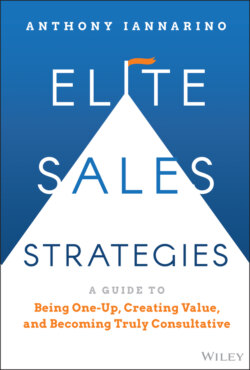Читать книгу Elite Sales Strategies - Anthony Iannarino - Страница 8
Three Miles High and One-Down
ОглавлениеI was standing at Basecamp 1 on Mount Everest, where the thinness of the air at 17,000 feet made it hard to breathe. I had no interest in climbing 12,000 more feet to scale the tallest mountain on Earth, but I could not pass up the chance to take some pictures. Unfortunately, I'd suffered from altitude sickness during my entire visit to Tibet: my hands and arms often started tingling, like when your leg falls asleep during a long flight, and more than once I woke up gasping for air. A week's worth of prescription medicine had not done me much good—the tingling was getting worse, and that day it had not stopped for hours. Three miles above sea level, I was becoming concerned.
Soon, even the small hill we were climbing was too much for me to handle. My Sherpa, the guide who arranged and led our trip that day, asked me what was wrong. I breathlessly pushed out the words, “I have altitude sickness. I'm tingling and it's hard to breathe.” He replied, “Are you taking altitude medicine?” I pulled the small box of pills out of my pocket and explained that my doctor prescribed them. The Sherpa took one look at the medicine and diagnosed me: “The medicine is what's making you sick. Throw it away, then walk faster so you can get more air into your body.” Walk faster? I can barely inch up this hill! But I knew I had to make a choice: Did I trust my guide or my doctor?
Earlier in the day, I had visited my Sherpa's home. On the ground level, donkeys and chickens roamed around on a dirt floor, warmed by a smoke-belching potbelly stove. The outside of the house was covered in yak dung that had been shaped into patties and pressed against the outside walls, each one with an individual handprint of one of the Sherpa's family members. That detail struck me as I pondered my dilemma: I was being advised by a man whose house is covered in yak dung. I was positive that my physician, Dr. Zimmerman, an educated man, used a more, well, conventional insulation to keep his house warm. But I also knew that my doctor had never even been to the Himalayas, let alone Basecamp 1. And while my Sherpa had no formal degrees, he makes a living guiding people up to Everest.
After a long moment, I threw the medicine in a nearby trash can and started walking faster. My lungs burned, but the harder I worked to get up the hill, the better I started to feel. My Sherpa was right: I was getting more air into my lungs. Neither my education nor my doctor's years of medical school could match his knowledge and experience. That expertise put him in the One-Up position, a more valuable resource than a hundred degrees.
